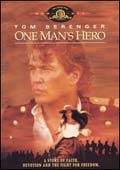One Man's Hero
Reviewed by: Brett Willis
STAFF WRITER
| Moral Rating: | Average |
| Moviemaking Quality: |
|
| Primary Audience: | Mature Teen to Adult |
| Genre: | War, Docudrama |
| Length: | 2 hr. |
| Year of Release: | 1999 |
| USA Release: |

| Featuring |
|---|
| Tom Berenger, Joaquim de Almeida, Daniela Romo, Mark Moses |
| Director |
|
Lance Hool |
| Producer |
| Tom Berenger, Lance Hool, Conrad Hool, William J. Macdonald |
| Distributor |
| Orion/MGM |
This film deals with not one but two uncomfortable issues in U.S. History: the 1846 Mexican War and the “special treatment” of Irish recruits by the military.
Ireland was devastated by potato crop failures in the 1840s, and many Irish came to America. Young male immigrants were promised citizenship in return for enlisting in the Armed Forces.
As the film opens, several Irish recruits in a Western military unit are under arrest because they asked for passes to attend Mass over the Mexican border, which their officers viewed as “consorting with the enemy.” Sgt. John Riley (Tom Berenger), a career soldier who is also Irish, at first ignores their pleas for him to intervene. But when he learns that the men are going to be illegally lashed, he rebels against his officer and frees several of the prisoners. Escaping into Mexico, they’re captured by guerilla/bandit Cortina (Joaquim de Almeida). As war with the U.S. looms, the Mexican Army “suggests” that Cortina’s men enlist, and makes the same offer to the Irish deserters which Cortina holds prisoner. Riley had intended to return to his post, but care for his men compels him to enlist along with them. Soon, many other Irish are also deserting to the Mexican side and joining the “Saint Patrick Battalion.” Unlike the broken U.S. promises, Mexico actually does grant them citizenship; and they fight bravely.
The first time the Saint Patricks are captured, they and other Mexican soldiers are released because American support of the war is lukewarm (in fact, Congress is considering impeaching President Polk). The second time they’re captured, they’re dealt with severely. In a touch of dark humor, Irish actor Patrick Bergin is cast as Gen. Winfield Scott, who passes sentence on the Saint Patricks.
Content
There are several hundred on-screen killings during the battle scenes; also whipping, branding and hanging. All these scenes have a slightly less “realistic” touch than in many modern war movies. No sexual content; Riley ends up with Cortina’s former girlfriend (Daniela Romo), but that’s handled tastefully. There’s a small amount of profanity including expletive use of “Jesus.”
The film’s details are fictitious, but the overall story is accurate.
Treatment of Catholics: Some U.S. military officers accused the Irish and other Catholics of inherent disloyalty because of their commitment to the Pope and therefore to his country (the Papal States). If that was a valid concern, the consistent approach would have been to bar them from military service in the first place (and certainly not actively recruit them) rather than expect them to magically change their beliefs once inducted. But in the real world, recruiters and field officers have different priorities.
Mexican War: The U.S. expanded its Western border by practicing “passive aggression”—encouraging emigration to northern Mexico, knowing that once enough Anglos were concentrated there, they’d demand American institutions and thereby destabilize the region. For awhile, Mexico invited Anglos into Texas; after further immigration was forbidden in 1830, we ignored that edict and kept on settling in all the Mexican provinces from Texas to California. Texas declared independence from Mexico and joined the United States. Then the U.S. falsely claimed that the southern border of Texas was the Rio Grande rather than the Rio Nueces, went to war over that issue, and annexed half of Mexico.
Until the Vietnam War era, our textbooks and popular media tended to portray the United States as “always right.” Since then, it’s been the opposite. The truth is somewhere in between. The only perfect society will be the upcoming Kingdom of Jesus Christ (Rev. 11:15).


PLEASE share your observations and insights to be posted here.